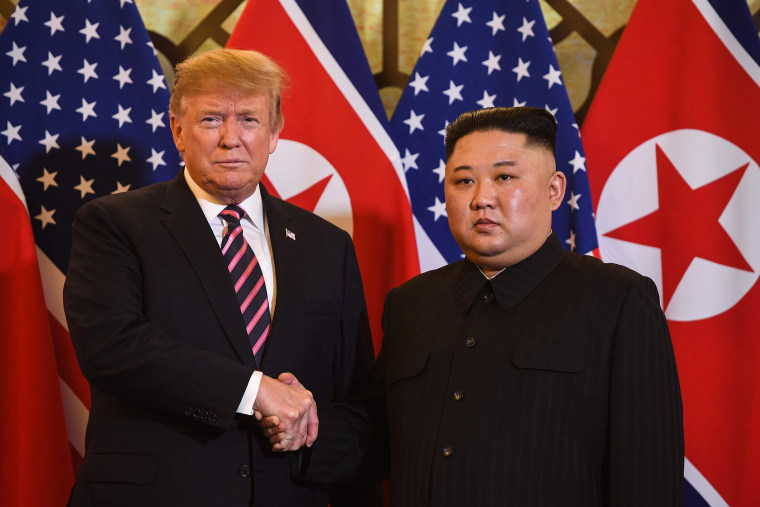HANOI, Vietnam — President Donald Trump broke bread with his "friend" Kim Jong Un on Wednesday to open their nuclear summit just hours before Michael Cohen delivered a damning account of the president's personal, business and campaign practices in a public congressional hearing half a world away.
Before the two leaders sat down to dinner, Trump ignored shouted media questions about Cohen's testimony — and reporters who asked questions were later excluded from the small group of journalists with access to the dictator and the president.
"Due to the sensitive nature of the meetings we have limited the (press) pool for the dinner to a smaller group," White House press secretary Sarah Sanders said.
Trump stuck to the message he wanted to deliver.
"I felt the first summit was a great success," Trump said of his meeting with the North Korean leader in Singapore last year. "I think this one, hopefully, will be equal or greater than the first. And we have made a lot of progress. I think the biggest progress was our relationship is really a good one."
Trump demurred when asked whether the summit might result in a peace agreement ending the Korean War. "We'll see," he said.
Later, with Kim by his side, Trump sounded optimistic that the two would be able to strike a deal when they meet late Wednesday night into Thursday morning.
"A lot of things are going to be solved, I hope," the president said. "And I think it will lead to wonderful — a really wonderful situation long term. And our relationship is a very special relationship."
The White House Correspondents Association pushed back Wednesday on what it called "the capricious decision to exclude some journalists from a press encounter with President Trump and Chairman Kim," the second time this week reporters there have faced what WHCA president Olivier Knox described as "arbitrary last-minute restrictions on coverage."
Meanwhile, Trump's focus was divided between the tasks at hand and politics back at home.
After Cohen's opening statement to the House Oversight and Reform Committee was published ahead of his testimony, Trump attacked his former personal attorney on Twitter, accusing him of "lying in order to reduce his prison time."
He also insulted Sen. Richard Blumenthal, D-Conn., a favorite Trump target, for having said in the past that he served in Vietnam when his wartime duty was in the U.S.
"I have now spent more time in Vietnam than Da Nang Dick Blumenthal, the third rate Senator from Connecticut (how is Connecticut doing?)" Trump tweeted. "His war stories of his heroism in Vietnam were a total fraud — he was never even there. We talked about it today with Vietnamese leaders!"
But Trump's main mission here is to get Kim to give up his nuclear weapons. An administration official insisted to NBC News that Trump was "100 percent dialed in" for his meeting with Kim.
The president's strategy relies on the conclusion that Kim will ultimately choose to disarm in exchange for relief from crippling sanctions and the promise of prosperity for his nation.
"Vietnam is thriving like few places on earth. North Korea would be the same, and very quickly, if it would denuclearize," Trump tweeted. "The potential is AWESOME, a great opportunity, like almost none other in history, for my friend Kim Jong Un."
But foreign policy experts and lawmakers in Washington worry that Trump's appetite for announcing a deal could lead him to give away too much without getting a firm commitment from Kim to identify and remove his weapons.
"The administration should make clear to Pyongyang that the only way we will dismantle the U.S. and international sanctions regime is when Pyongyang completely dismantles every single nut and bolt of its illicit weapons programs — not a minute earlier," Sen. Cory Gardner, R-Colo., the chairman of the Senate Foreign Relations subcommittee that deals with North Korea, told NBC before the summit.
Kim has incentives to give up his nuclear program for sanctions relief — but it's not likely to happen quickly — according to Vincent K. Brooks, a retired Army general who commanded U.S. forces in South Korea.
"Does he have sufficient trust in what the U.S. is going to do, what the South Koreans are gonna do, what the Japanese are going to do, what the Russians are going to do, what the Chinese are going to do? The five countries around North Korea," Brooks said in an interview with NBC Nightly News anchor Lester Holt, who is broadcasting from Hanoi.
"Is there sufficient trust for him to just give it all up at once? And the answer is no, there is not. And there has to be a journey then to build the trust that is necessary to take the — the steps that would ultimately lead to a final, fully verified denuclearization of the Korean Peninsula," he added.
Yet there are reasons to think that Kim, who has suspended missile launches, isn't really willing to disarm, according to Jeffrey Lewis, director of the East Asia Nonproliferation Project at the James Martin Center for Nonproliferation Studies.
"I think the North Koreans are willing to talk about making relations better," Lewis, author of the recent book "The 2020 Commission Report on the North Korean Nuclear Attacks Against the United States: A Speculative Novel," said in an interview with Holt.
"And what they’re willing to offer is to reduce the profile of their nuclear weapons. They're happy to stop testing them and stop talking about them. But I don’t think they’re offering to give them up."


